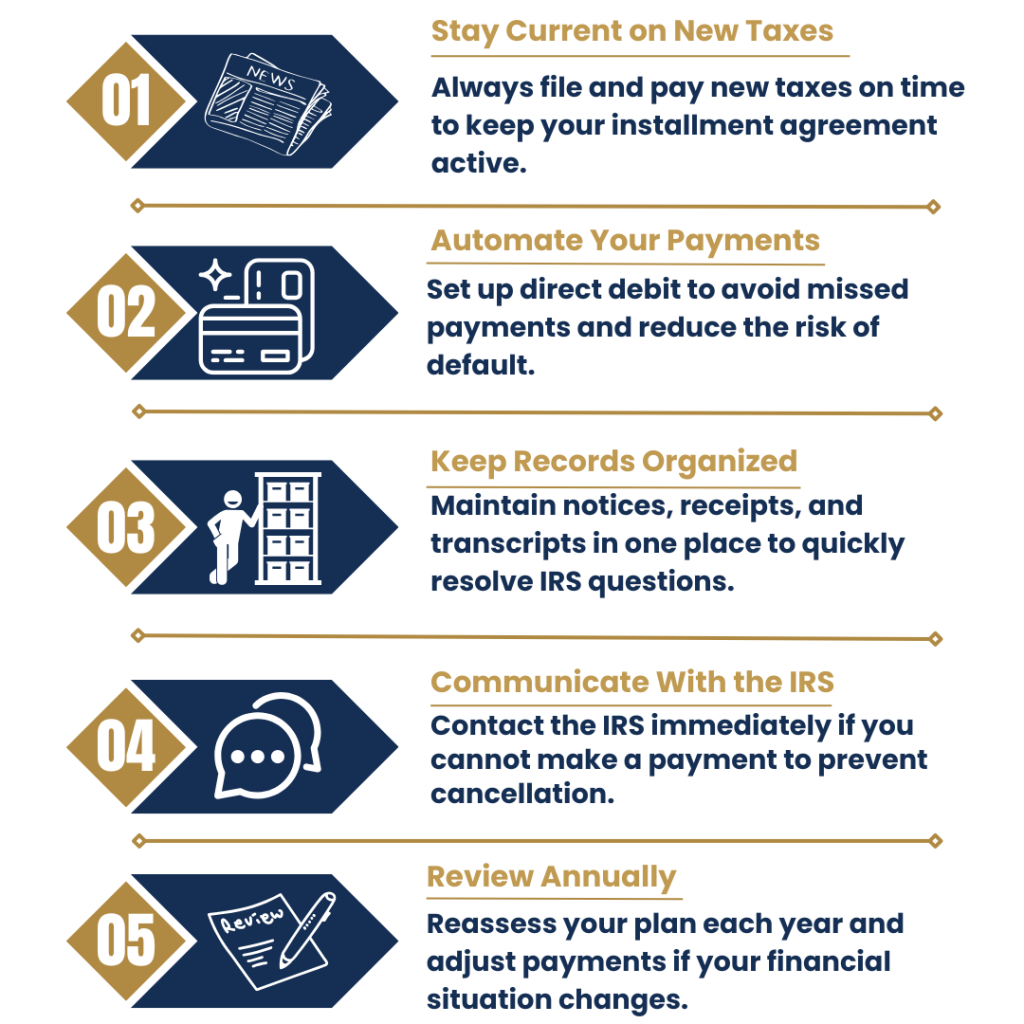An IRS installment agreement is one of the most common ways to handle unpaid tax debt. It allows taxpayers to make monthly payments toward their balance rather than facing immediate collection. The best practices for managing an IRS installment agreement payment plan include making every payment on time, staying current with new tax filings, and keeping communication open with the IRS.
When these agreements are managed properly, they protect you from more aggressive collection actions such as wage garnishment or bank levies. When they are mishandled, the IRS can declare a default, add new penalties, and restart collections. This is why many taxpayers choose to work with J. David Tax Law, a firm that helps clients not only set up installment agreements but also manage them effectively over time.
Set up an IRS installment plan with industry-backed experts.
Key Takeaways
- IRS installment agreements let you pay tax debt over time while avoiding aggressive collection actions.
- You must stay current with new tax filings and payments to keep the agreement valid.
- Automating payments and keeping organized records help prevent mistakes and disputes.
- Refunds are applied to your debt but do not replace monthly installment payments.
- Penalties and interest continue to accrue, so plan your budget carefully.
- Working with a tax attorney can help you secure manageable terms and avoid default.
The IRS is Forgiving Millions Each Day. You Could Be Next.
What Is an IRS Installment Agreement?
An IRS installment agreement is a payment plan that allows taxpayers to pay their outstanding balance over time rather than in a single lump sum. It is one of the most common forms of tax relief because it prevents the IRS from using aggressive collection methods as long as you remain in compliance.
There are several types of installment agreements. Short-term agreements are for balances that can be paid within 180 days. Long-term agreements, also known as streamlined installment agreements, allow for monthly payments spread over several years if the debt is under a certain threshold. For larger or more complex tax liabilities, partial pay agreements may be used, where the taxpayer pays what they can reasonably afford until the statute of limitations expires.
Each type of agreement has its own eligibility rules and requirements. Understanding which one applies to your situation is important, since choosing the right plan can save money and provide more flexibility.
Best Practices for Managing an IRS Installment Agreement Payment Plan

Stay Current on New Taxes
The IRS expects you to remain fully compliant once your installment plan is in place. That means filing every new tax return on time and paying any new taxes in full. If you fall behind again, the IRS can cancel your agreement immediately. For example, a business owner who made their monthly installment payments but failed to deposit payroll taxes on time saw their agreement revoked and new penalties added. Staying current avoids this trap.
Automate Your Payments
Whenever possible, set up direct debit from your bank account. Not only does this reduce the risk of forgetting a due date, but it also signals to the IRS that you are serious about compliance. IRS representatives often note that taxpayers on direct debit agreements are less likely to face additional scrutiny. It is one of the simplest ways to build trust with the agency.
Keep Your Records Organized
Communicate Directly With the IRS When Needed
Review the Agreement Each Year
How Does an Installment Agreement Impact Tax Refunds?
One of the most common surprises for taxpayers on installment agreements is how refunds are handled. If you are under an agreement and the IRS owes you a refund, the refund will not be sent to you. Instead, it is automatically applied to your outstanding balance until your debt is fully paid.
For example, if your monthly installment payment is $300 and you are expecting a $2,000 refund, the IRS will keep the refund and apply it toward your debt. Your scheduled monthly payments will still be required unless the refund fully pays off what remains.
It is also important to remember that refunds applied to your debt do not count as an “extra” installment payment. You still need to make your regular monthly payments unless the refund clears your entire balance. Many taxpayers assume a refund gives them a break, only to receive a default notice when they skip their payment.
The practical takeaway is to avoid relying on tax refunds as part of your annual budget while on an agreement. Instead, plan as though you will not receive them. If cash flow is tight, work with a tax attorney to renegotiate your agreement for a more manageable payment rather than hoping for a refund you will never see.
Benefits of Choosing J. David Tax Law for Installment Agreements
Managing an IRS installment agreement on your own can feel overwhelming, especially when the IRS adds penalties or threatens collection action for even small mistakes. Working with a trusted law firm makes the process smoother and more secure. Here are the benefits of choosing J. David Tax Law for installment agreements:
Attorneys Handle Your Case Directly
Fast Protection Against IRS Collections
Customized Payment Plans
Proven Track Record
Transparent Fees and Free Consultation
Common Mistakes to Avoid with IRS Installment Agreements
Even with an approved agreement, it is easy to make small mistakes that can put you back in trouble with the IRS. Avoiding these pitfalls will help you stay compliant and finish your payment plan without unnecessary setbacks.
Missing or Skipping Payments
Forgetting to Budget for Penalties and Interest
Ignoring IRS Notices
Not Renegotiating When Circumstances Change
Assuming a Refund Will Cover Payments
Keep Your IRS Installment Agreement on Track
An IRS installment agreement can be one of the most effective tools for resolving back taxes, but it only works if you manage it carefully. Staying current with filings, making every payment on time, and adjusting the plan when life changes occur are all essential to keeping the agreement in good standing.
The process does not have to feel overwhelming. With professional guidance, you can avoid costly mistakes and stay protected from IRS collections.
Contact J. David Tax Law today for a free IRS payment plan consultation.




















